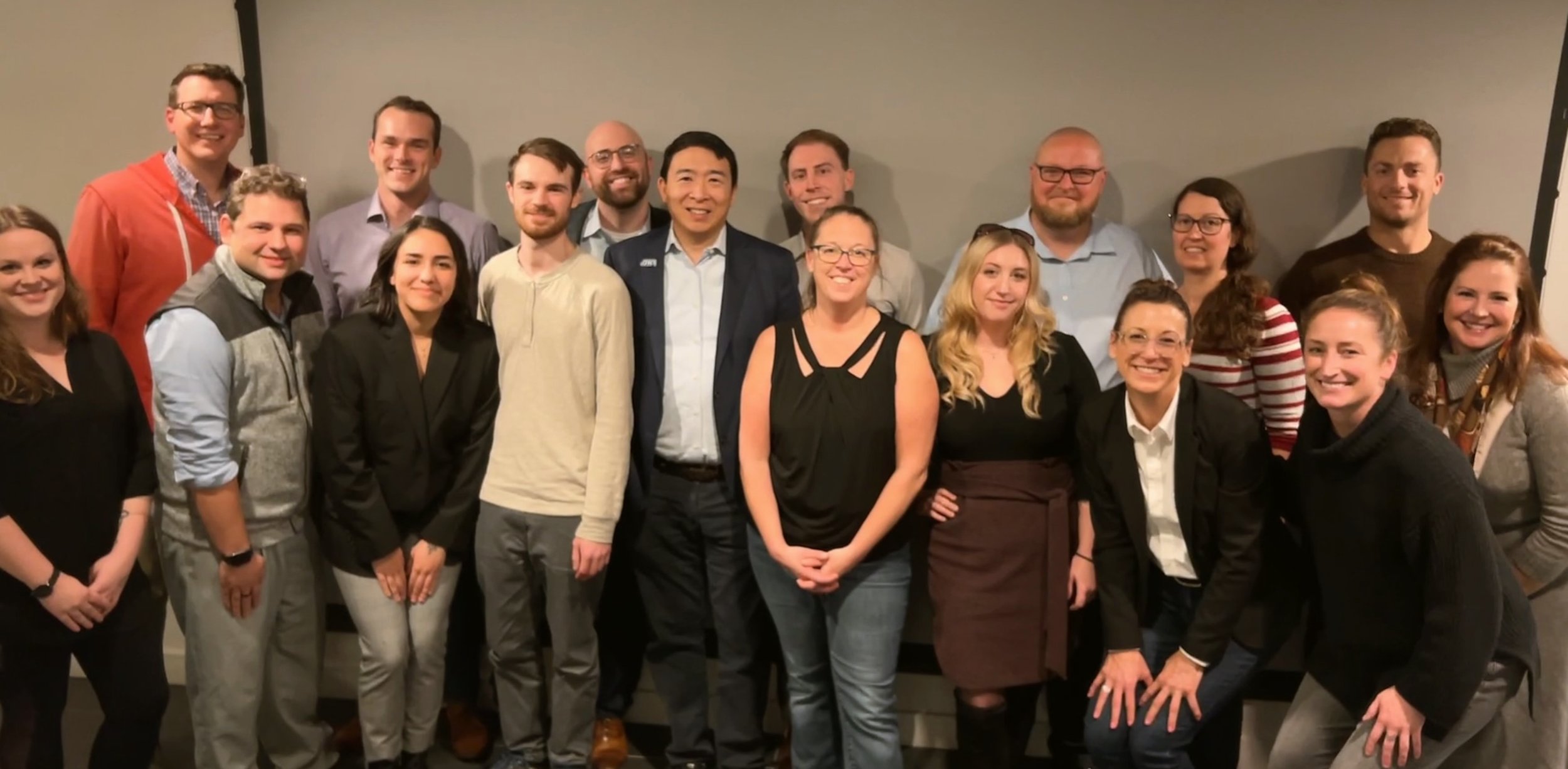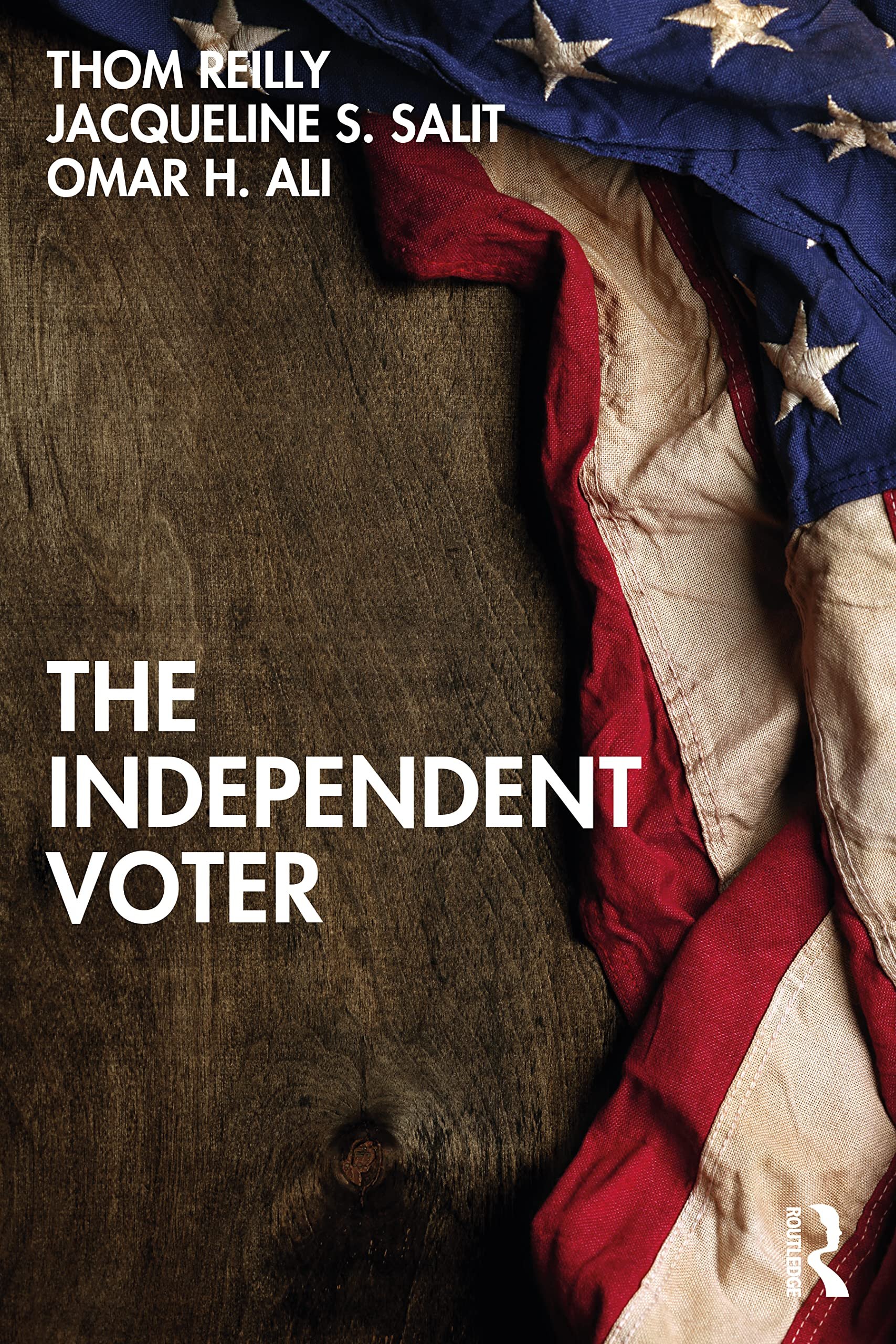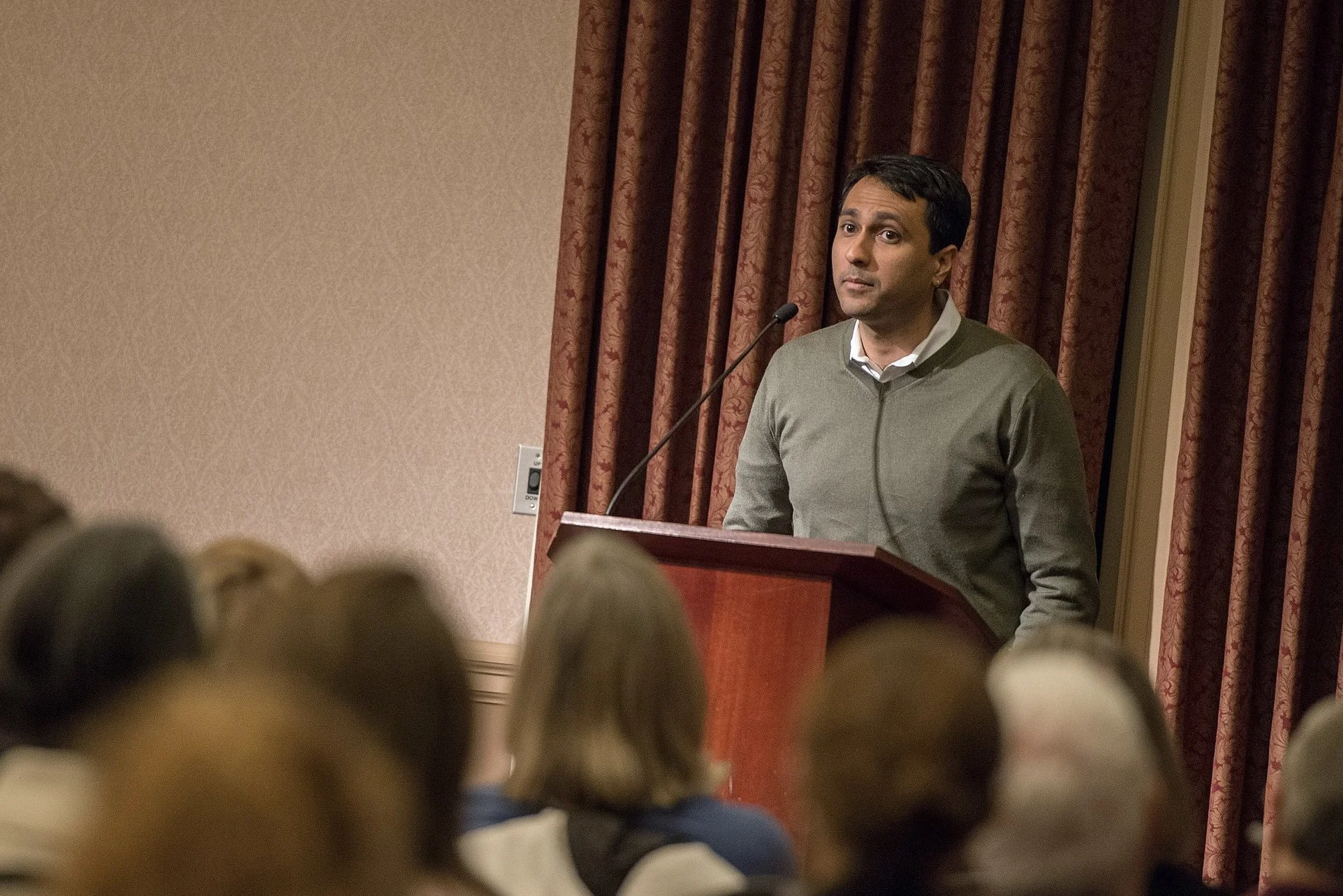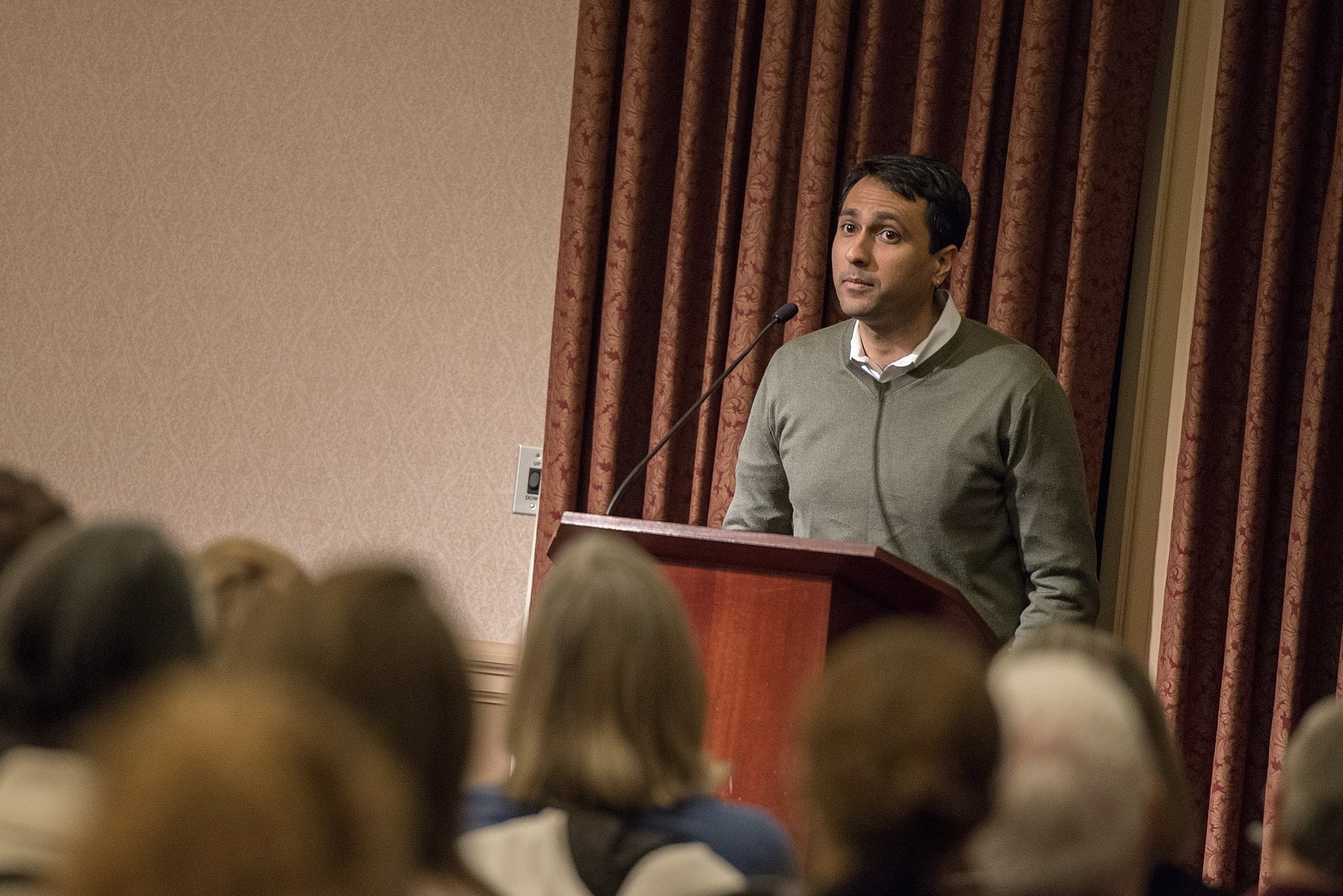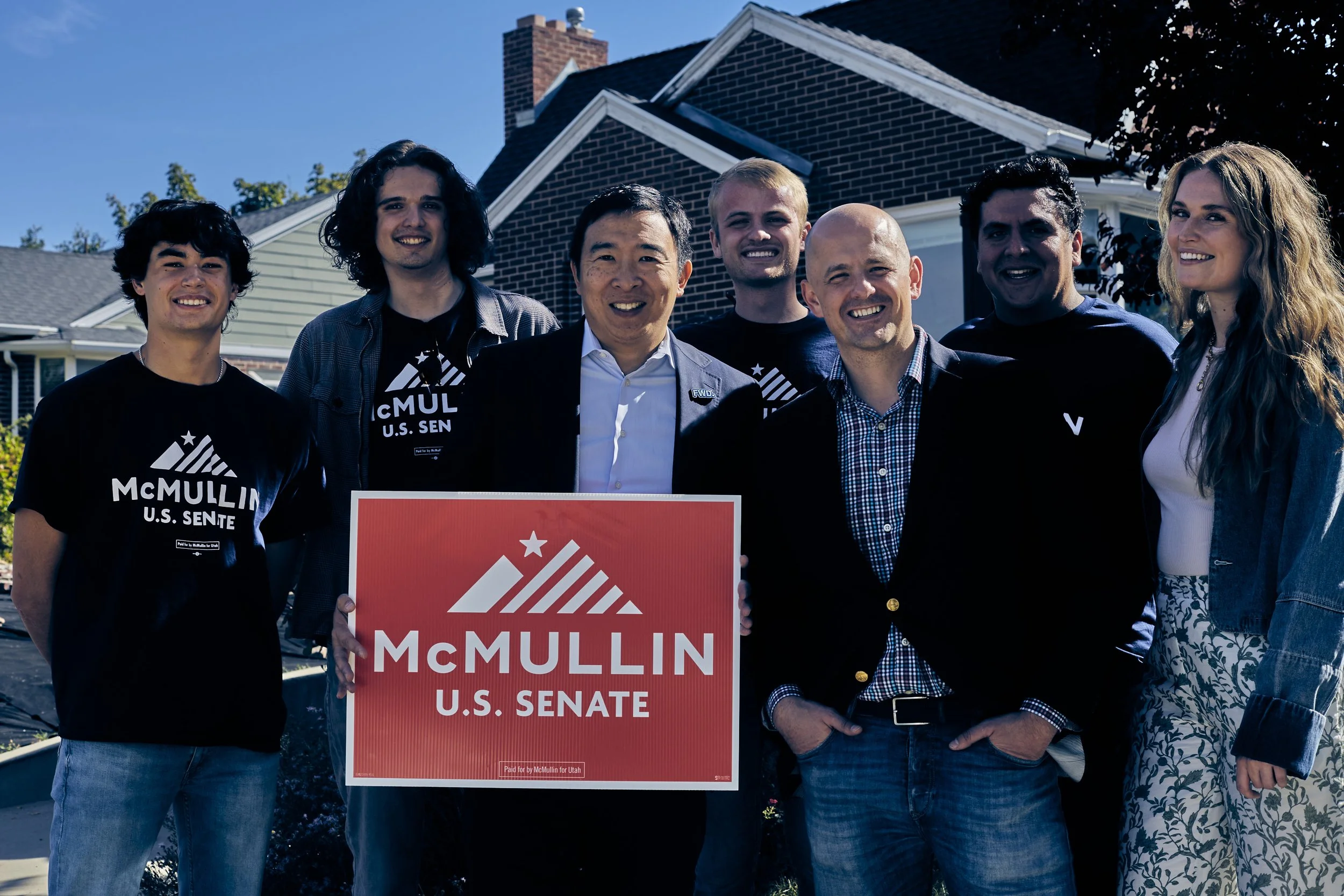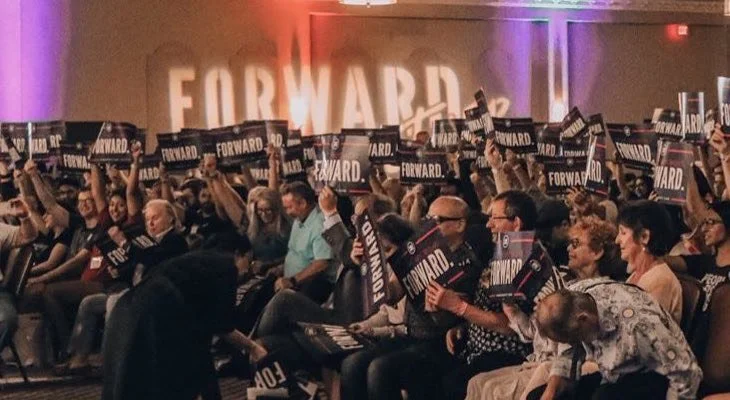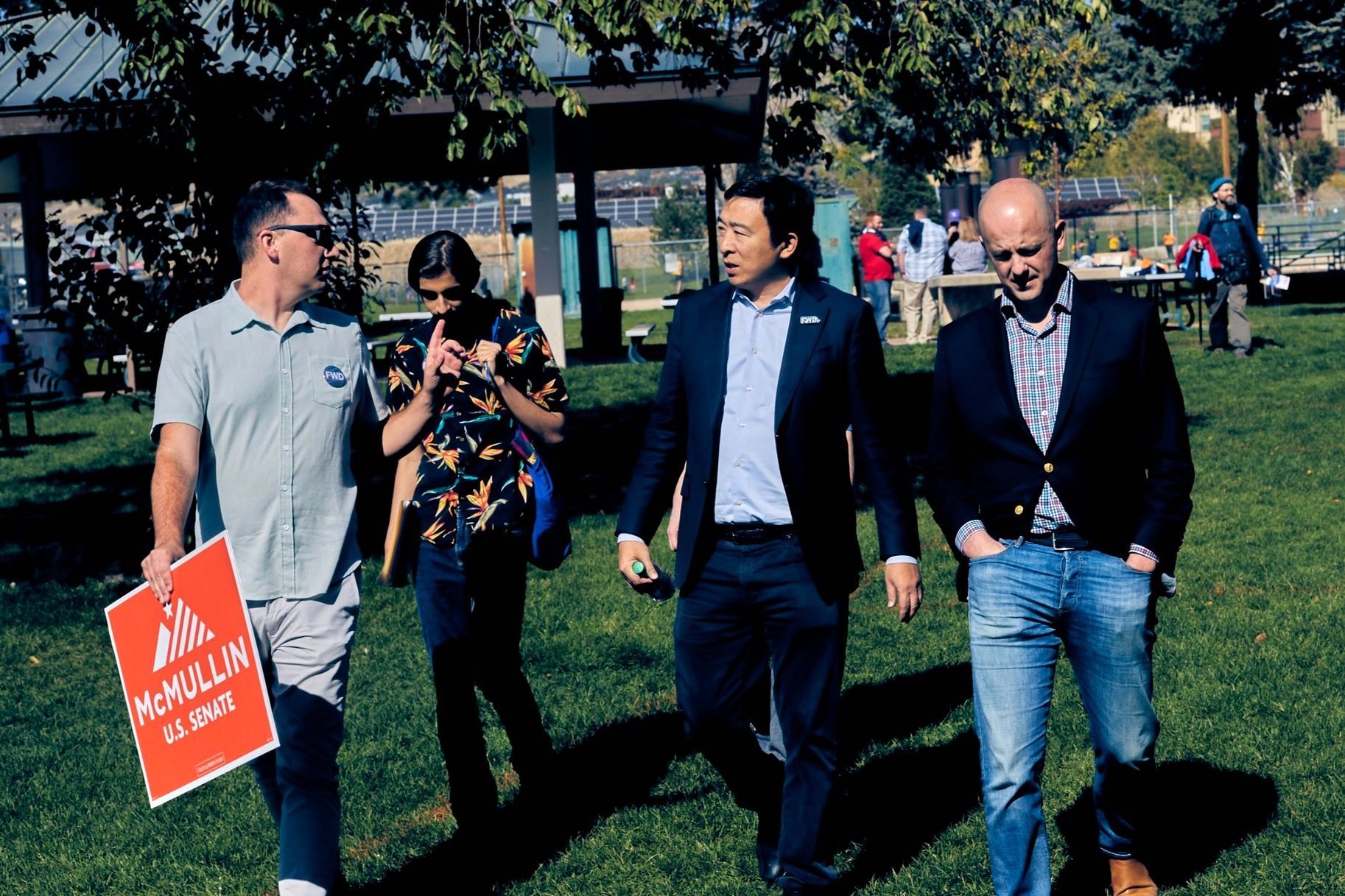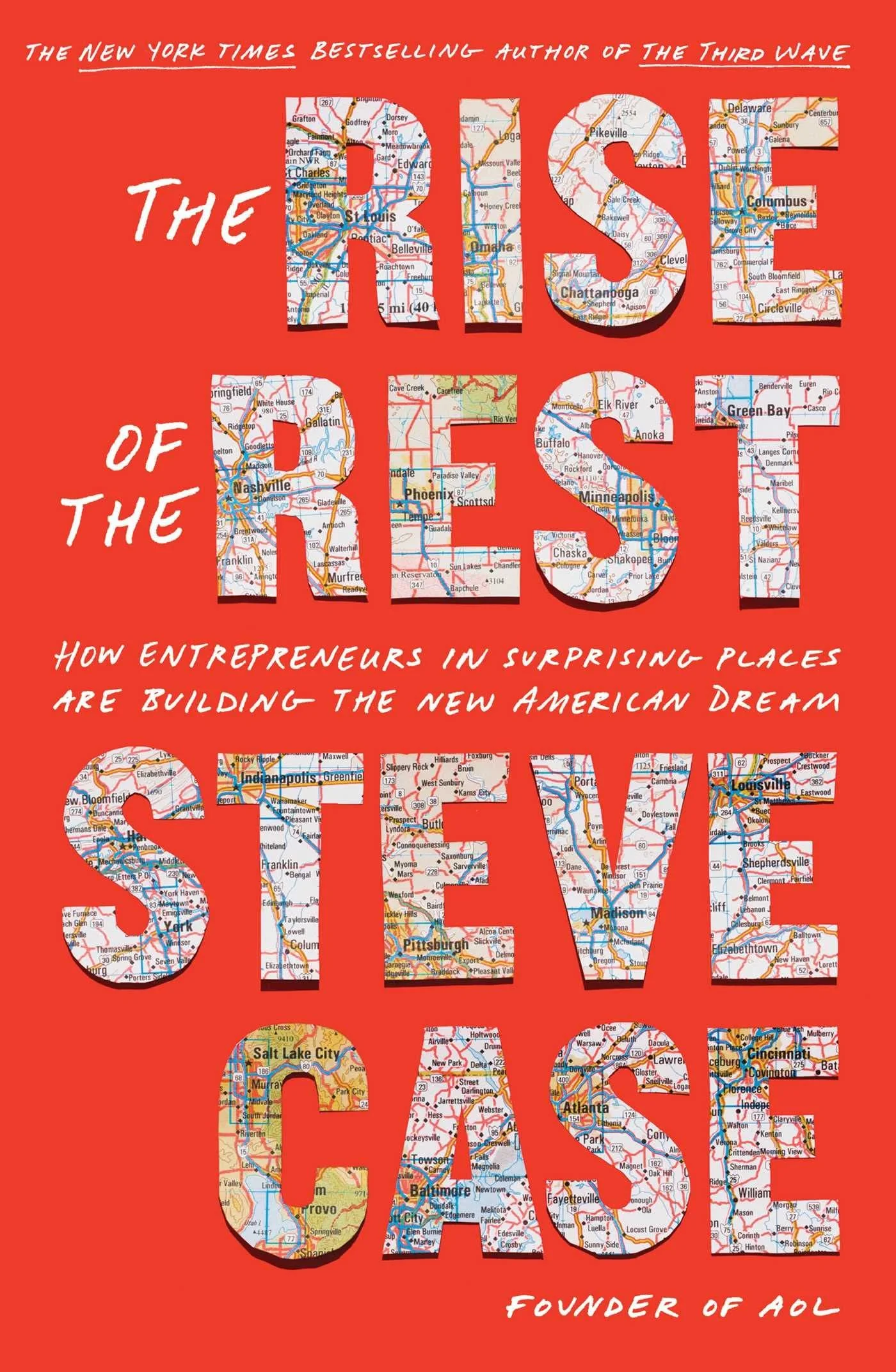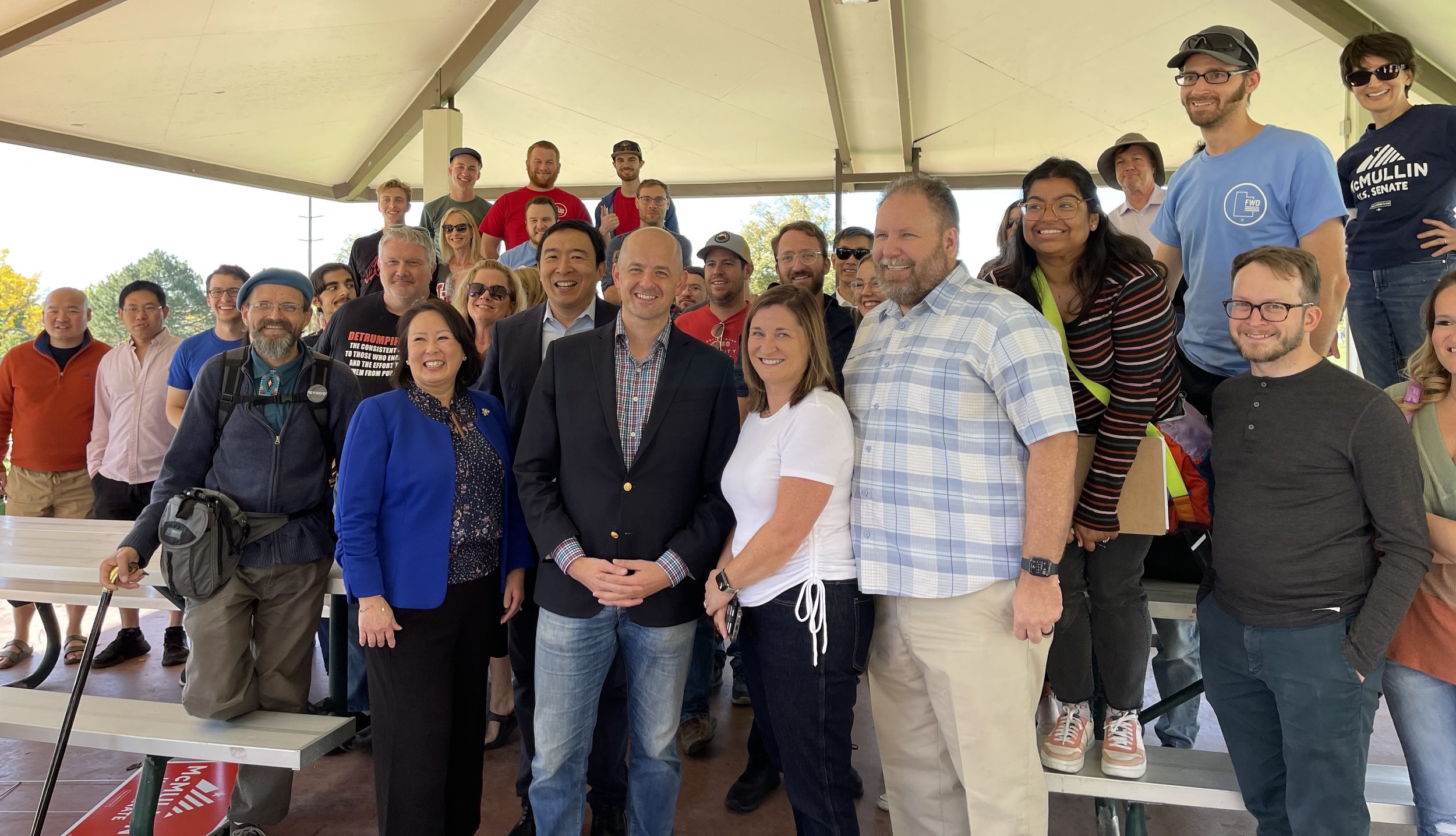
Building Up
Kyrsten Sinema made headlines this past week in becoming an Independent. It wasn’t a total surprise to us. Arizona will be a big hotbed for Forward as a ballot initiative to shift to non-partisan primaries and Ranked Choice Voting (“Final Five Voting”) similar to Nevada’s is gearing up for 2024. The same is true in up to 5 other states.
Hello, I hope that your December is going well!
Kyrsten Sinema made headlines this past week in becoming an Independent. It wasn’t a total surprise to us. Arizona will be a big hotbed for Forward as a ballot initiative to shift to non-partisan primaries and Ranked Choice Voting (“Final Five Voting”) similar to Nevada’s is gearing up for 2024. The same is true in up to 5 other states.
Also this past week, a number of Forward state leads from Michigan, Florida, Connecticut, Arizona, and Utah gathered in New York City to help us improve our processes. It was phenomenal and inspiring to meet them – they are the people who will deliver change around the country.
They are not alone.
In Colorado, Forward state leaders are kicking off signature gathering for party status right now. Nevada will be filing a certificate this week to start a registration drive. Maine, Louisiana, Maryland, North Carolina, South Carolina and others are similarly launching. We have already achieved minor party status in Texas thanks to the awesome state leads and volunteers there.
In Connecticut, the newly re-elected governor Ned Lamont recently endorsed Ranked Choice Voting and is expected to make it a top priority in his state-of-the-state address in January. Click here for an account of how this happened – it’s worth a read to understand the background. Forward Party leaders are set to support a legislative push to support legislation that should take place in Connecticut in February or March.
All over the country, we have big opportunities and a lot of work to do. Now that the midterms are behind us, we will focus on building up in states, getting on the ballot around the country, helping municipal candidates in 2023 and prepping for ballot initiatives.
I interview David Jolly, former member of Congress and head of the SAM Party on the podcast this week. As David puts it, "What we are seeing at Forward is this catalyzing of the movement . . . the success is in the organizing at the state level, where hundreds and thousands of people are signing up and saying, 'I want to do the things under state law that allow us to achieve ballot access, party recognition, that allow us to run candidates' . . . all of that happens without the notice of the pundits or the newspapers. That's where the success of the movement happens . . . people can go to their local Forward Party chapter and get involved and create the success . . . at Forward you have the people who are smart enough to take on the rigged system in a dozen different places and over time transform American politics."
How can you help? Join your state’s Forward Party here. Tell your friends that they can help. Donate to support our efforts or buy some merch. Sign up for one of the efforts described above. We have a bright path in front of us, but we need to roll up our sleeves and get stuff done.
Meeting some of the state leads was a blast – with them leading the way there’s no limit to what we can accomplish. But they need our help. Let’s build. Happy Holidays!
-------------------
Forward is holding a free webinar on Wednesday night with me, former NJ Governor Christine Todd Whitman, Miles Taylor and David Jolly. Then on Thursday I am heading to Philadelphia for an Ideas Festival run by the Philadelphia Citizen to talk about Forward. See you online or in Philly!
Mr. Ranked Choice Voting
A couple years ago, I was on a Zoom with a couple of activists who wanted to improve our democracy. I asked them, “Who is the most well-known, prominent advocate for ranked choice voting?”
Hello, I hope the Holiday Season is gearing up for you and yours!
A couple years ago, I was on a Zoom with a couple of activists who wanted to improve our democracy. I asked them, “Who is the most well-known, prominent advocate for ranked choice voting?”
They answered with two words: “Probably you.”
That answer stunned me. Really? That didn’t seem possible. But after I reflected I realized it might be true, simply because I was perhaps the most significant political figure who wasn’t beholden to either of the major parties. It’s hard for a Democratic or Republican political figure to be for Ranked Choice Voting simply because their party might take a different position on it as against their interests.
Indeed, last month when I was in Nevada campaigning for Question 3, people were showing me text messages from the Democratic Party saying “Vote No on Question 3, because it will be too confusing and cumbersome for people to vote.” Yes, that was their primary argument: choosing more than one candidate would be too confusing, despite copious real-life experience with Ranked Choice Voting that the vast majority of voters find it easy to use and want to use it again.
What’s the real reason? It loosens party control and gives voters more autonomy.
I realized months ago that most all of the solutions I proposed on the presidential trail would only happen if we had a system like Ranked Choice Voting that empowered voters to vote for whomever they want and allowed both new perspectives to emerge but also fostered a greater degree of accountability among elected officials. I wrote my book, “Forward” as what I hoped would be a thoroughly entertaining but well-researched argument for Ranked Choice Voting. RCV is obviously core to the Forward Party’s agenda.
(For a video explaining Ranked Choice Voting if you’re new to it, click here. It’s the bomb.)
Still, I’m a relative newbie when it comes to this reform mission. You know who the real Mr. RCV is? Rob Richie.
Rob, whom I interview on the podcast this week, is the co-founder and CEO of Fairvote, a non-profit organization that has been promoting Ranked Choice Voting for 30 years. Yes, that’s right, Rob was so far ahead of the curve he’s been arguing for this since 1992. He has made it his life’s work.
“I got started in the early 90’s in my 20s because I thought it would be important to have more choices in the presidential election. We were a tiny crew back then. We've come a long way and have been receiving a ton of new energy and support. It’s very exciting. RCV passed in 8 new cities and counties this Election Day, bringing it up to about 60. Our goal is 500 communities using RCV over the next few years.”
At the state level, RCV took a big leap forward when it was adopted by Maine in 2016. Explains Rob, “Maine had had 3 straight governors who won with less than 50% of the vote because of more than 2 candidates running. Eventually they said, ‘we should fix this system so the winner needs to get a majority’ and adopted RCV.” Alaska followed suit in 2020, which led to the results we saw this period with Sarah Palin losing, Mary Peltola winning, and Lisa Murkowski winning despite voting to impeach Trump.
Fairvote also helps colleges adopt Ranked Choice Voting for student council elections and organizations do the same. The theory is that if thousands of college students get used to RCV, they’ll think “Why isn’t this being adopted for all elections?” It’s pretty ingenious.
Rob sees RCV as a big piece of the puzzle, but is also excited about other ways for our democracy to advance and evolve. “We should have more than 435 members of Congress given how much our population has grown since 1910, when they capped the number. We are backing the Fair Representation Act, an act of Congress that would shift us to multi-member districts and would lead to a multi-party system. The great thing is it’s just a law – a simple majority of Congress could pass it.”
I was invited to join the Board of Fairvote Action last year and gladly agreed. I see Fairvote and Forward as allies in the same fight for a better system of governance that places people and voters first.
Though RCV has more momentum than it ever has, because Rob’s been at this for so long, he takes the long view. “There will be progress and stumbles, victories and pullbacks.” Hopefully, if enough of us make our voices heard, we’ll have a lot more wins than losses, as was the case in Nevada and other communities this November. Let’s keep the wins coming.
For my interview of Rob click here. Check out Fairvote and click here to sign up for the Forward Party in your area. Also 'Forward' is now out on paperback!
The Independent Voter
This week on the podcast I interview Jackie Salit, co-director of the Center for Independent and Sustainable Democracy at ASU and co-author of the new book, “The Independent Voter.”
In 2020, after doing a lot of reading and research, I concluded that the two-party system in the United States is failing and polarizing us and needs an upgrade via mechanisms like non-partisan primaries and ranked choice voting. You know who figured this out a long time before I did? Jackie.
Jackie has been a part of independent political movements since the 1980s and is the President of IndependentVoting.org. “I got involved during the Lenora Fulani Independent presidential campaign of 1988 – she was the first African American woman to get on the presidential ballot in all 50 states, as a third party candidate no less.”
Today, there are more Independents than ever according to polling – between 40 and 50% of Americans now self-identify as Independent or unaffiliated. Jackie writes that Independent Voters have several distinct purposes. First, they inject new ideas into the two major parties. Second, they swing and shape elections – they did so just this past month by leaning toward Democrats by 4 points, contrary to expectations. And third, they can be the bridge to a post-partisan less ideological political system.
Also interestingly – Independents tend to make those around them less extreme and more open to discussion and disagreement. Independents are less likely to end a friendship over a political argument, for example.
So, everyone must love Independents, right? Quite the contrary; both the media and academics tend to minimize their existence. “Pollsters often deny the existence of independents by categorizing voters based on which direction they leaned or voted in the past, and articles often claim that Independents are just closet partisans who don’t like to admit it. That’s what we’re looking to change – there’s actually a ton of interesting scholarship and study that can be done on who Independent voters are and what matters to us.”
Jackie writes: “The key to forestalling a move beyond the two parties is to ruthlessly enforce the power of party identification. How is this done? Through a complex matrix of laws, rules, and psychological and social messaging that the two-party system and a left-right ideology represent the totality of possibility.” That put a very fine point on it. It’s actually an uphill climb for Independents to make their voice heard in a system that tries to discourage it, even as this body of voters is necessary to win most any contested election.
Another observation that points out how unusually strong partisanship is in the U.S. – “the United States is the only democracy in the world that permits partisan contests for election officials. In other democracies, elections are run by independent commissions or agencies shielded from political influence.” This is common sense. We are the only country that thinks having a state’s Secretary of State who runs elections having to win an election representing one party or the other is a good way to go.
Jackie’s book concludes with a couple of very compelling arguments in addition to non-partisan primaries and ranked choice voting:
“No American should be required to join a political party or organization as a condition of voting.” Right now many Independents effectively can’t vote in the primaries that decide most elections. That’s against the spirit of democracy.
“No taxpayer dollars should be used for party business, including primaries, if the parties decide to hold them as a means of endorsing a candidate.” Similarly, asking Americans to pay for elections they might not be able to participate in doesn’t seem fair.
Fundamentally, you have the people, the parties and the country. Which wins out in the end? Any move to a post-partisan future starts with the recognition that the interests of people and the parties that claim to represent them aren’t always aligned. More Americans are waking up to this reality every day. Let’s speed it up.
I’m proud to say that Jackie is now a Board member of Forward Party! She’s been fighting for people and communities’ right to have a say in their own future for years. If you’d like to join us, check out Forward here.
We Need To Build
I spent part of this past week for Forward in Arizona, which I believe will be ground zero for democracy over the next two years. You probably know about the very closely contested race between Katie Hobbs and TV personality Kari Lake or the Senate race between Mark Kelly and Blake Masters.
Hello, I hope you and yours are ready for a great Thanksgiving holiday!
I spent part of this past week for Forward in Arizona, which I believe will be ground zero for democracy over the next two years. You probably know about the very closely contested race between Katie Hobbs and TV personality Kari Lake or the Senate race between Mark Kelly and Blake Masters. Arizona is set to be one of six swing states in 2024 – along with Nevada, Georgia, Pennsylvania, Wisconsin and Michigan – and many in AZ are concerned with the turn taken by the state Republican Party.
There are activists and leaders who would like to follow Nevada’s lead in running a ballot initiative in Arizona for nonpartisan primaries and ranked choice voting. Stay tuned.
Bigger picture though, imagine a coalition of several hundred thousand swing voters in Arizona, Nevada, Georgia, Pennsylvania, Wisconsin and Michigan who come together to fight for democracy reform in 2024. A bloc of voters like that could credibly swing the next presidential election given how polarized the country is; even 100,000 votes would have decided 4 of those 6 states in 2020. Forward is well-positioned to build such a coalition in the next two years.
On a related point, this week on the podcast I interview Eboo Patel, the Founder and President of Interfaith America and the author of the new book “We Need to Build: Field Notes for Diverse Democracy.” Eboo served on Obama’s Inaugural Faith Council.
Eboo is a movement and coalition builder. He has spent the last twenty years building a national organization to champion religious diversity in America. Eboo writes of the time in his twenties, fresh out of college, when he criticized the organizers of an interfaith gathering and said there should be more young people, action and variety. A woman placed her hand on his shoulder and said, “You should build that.” He joked during our podcast that he “felt like someone was calling his bluff.”
A major theme of Eboo’s book is that we have taught young people to criticize and point out the negative when what we need first and foremost is builders. “One of the things that strikes me about the fancy colleges . . . is that they are most likely to teach you a language of criticism and deconstruction, a language that encourages you to think of yourself as oppressed. I think this is a useful pair of glasses to put on from time to time, but it’s a terrible idea to do permanent surgery on your eyes such that you only see the bad things that happen to you. First of all, you are not oppressed. To use that word in reference to yourself [as an American college student] is to announce to the world that you utterly lack perspective. Most of the world would trade places with you in an instant.” This is particularly observant in a country where only the top 35% or so graduate from college; we are a nation primarily of high school graduates.
During our interview, Eboo says, “We make a mistake by separating everyone into the Wicked vs. the Wounded. Why is it that only certain types of people are allowed to be considered privileged? Most knowledge workers are among the privileged today. I want to fight bad things and ideas but you have to retain the right outlook. Islamophobia is wrong and worth fighting, but the beauty of Islam vastly transcends any Islamophobia.”
Many students today dislike fraternizing with people of different beliefs or politics, Eboo gives them this example: “Imagine you are a heart surgeon and you are scheduled to be part of a team of surgeons that is performing a life-saving operation. Let’s say you discover that one of the other surgeons or a nurse supporting the surgery disagrees with you on a political issue dear to your heart. Maybe that person voted differently in the last election and advertises it with a bumper sticker on her car. Do you refuse to do the heart surgery?” To date, not a single person has said they would walk out of the operating room. “I continue along the same path: what about a PTA? Or a volunteer fire department?”
“In a democracy you have to live with the people you defeat . . . telling someone else who they are – or more accurately, who you want them to be – is the height of presumptuousness.”
Eboo wants to form a big tent, the same way Forward does. “Purity tests are the enemy of broad-based movements . . .Instead of further cementing the current Us vs. Them, wouldn’t it be nice to create a wider sense of ‘Us?’ . . . the goal is not a more ferocious revolution; it is a more beautiful social order.” Eboo’s challenge is that to defeat the things we don’t like, we have to build the things we do.
With Forward; our democracy will either get an upgrade or become subject to some very negative actors and sentiments. We need to build the kind of democracy we would like to see. And we don’t have unlimited time.
To buy Eboo’s book click here. To check out Forward or make a donation click here. Happy Thanksgiving!
Trump is Back
Last night, as expected, Trump officially declared his 2024 campaign for the White House. It seems that most of America wants to move on from Trump, but that won’t happen unless someone defeats him or otherwise sends him offstage.
Last night, as expected, Trump officially declared his 2024 campaign for the White House. It seems that most of America wants to move on from Trump, but that won’t happen unless someone defeats him or otherwise sends him offstage.
Who will oppose him in the Republican field? His primary opponents are likely to include Mike Pence, Chris Christie, Larry Hogan, Mike Pompeo, Tulsi Gabbard, Francis Suarez, and a few others. The major variable is Ron DeSantis – I thought DeSantis would sit this cycle out based in part on what he was telling donors, but he might indeed run. DeSantis is going to be tied up with gubernatorial business until March of next year, when he could have a clearer picture for a decision. DeSantis strikes me as the greatest threat to Trump within the party in terms of money and grassroots support.
Have you seen Ron DeSantis speak? He is not the performer that Trump is. The fervor toward Ron has been generated largely by favorable media treatment.
The voting doesn’t start until February of 2024 – until then it’s money, speeches, polls, rallies and operations. Most other candidates will, I believe, have a hard time getting the attention and energy they need. Some candidates will feel pressure to get in early in order to try and stake out a lane. Others will prefer to wait to see if something changes.
On the Democratic side, Biden is already making moves for 2024 and has been emboldened by the midterms. I see him declaring early next year and clearing the field.
Trump is diminished by the midterms – and much of the media is determined to deny him - but he is still the favorite in my mind to win his party’s nomination. You can’t replace the grassroots energy he yet has with the bulk of the Republican base. And running against Trump remains a daunting experience for most; he wields grievance and anger like cudgels and his hostility evokes the same among his many followers.
To me, the most likely matchup for months has always been a rematch between Biden and Trump in 2024. The rematch no one wants is inching closer. Even as you and most Americans groan, the system will coalesce around these soon-to-be octogenarians until one or the other is unable to continue, or the system itself sees a change.
How will this Trump run end? I ran a Twitter poll last night. The results (13,000+ votes) were:
Drops out/fails – 15%
Loses in primary – 42%
Loses in general – 25%
Returns to White House – 18%
You can see any of these happening. You can put me in the camp as someone who thinks a second Trump term would be a catastrophe. Let’s do all we can to keep him out of the Oval Office. Don't underestimate him.
50-50 Nation
Hello, I hope all is great with you! Votes are yet being counted from Election Day; Congress is close, with the Republicans expected to win a slight majority in the House. It looks like the U.S. Senate may be decided by the Georgia runoff in December. Generally speaking, Democrats outperformed expectations in much of the country.
Hello, I hope all is great with you! Votes are yet being counted from Election Day; Congress is close, with the Republicans expected to win a slight majority in the House. The U.S. Senate will stay with the Democrats with close wins in Nevada and Arizona. Democrats outperformed expectations in much of the country.
9 Forward-endorsed candidates won their races, but perhaps the biggest win for Forward was that the ballot initiative Question 3 in Nevada passed! It shifts the state to non-partisan primaries and ranked choice voting, which also allows independents to vote in the primaries. It will be on the ballot again in 2024 to make the change permanent.
Yes, Nevada may follow Alaska’s example and do away with the party primaries that are distorting our politics and empowering extremists. For those who think that we are trapped, Nevada shows that there is indeed a way out. The people of Nevada spoke and they want a better way. Congrats to Cesar Marquez and the entire Nevada team for helping make it happen!!!
This week on the podcast I discuss the midterms with my former campaign manager and author of ‘Longshot,’ Zach Graumann. Some of our takeaways from Election Day:
The odds of a Trump – Biden rematch in 2024 went up considerably. Trump, despite a mixed-at-best showing in the midterms, will likely declare any day now. Joe Biden, vindicated by a surprisingly good result, is now much more likely to run for re-election. Biden took a victory lap this week, a sign of how he’s feeling about defying expectations. Joe will likely make a decision and announce early next year.
I tweeted, “I think Joe Biden is misinterpreting dislike for Republicans as enthusiasm for him.” He sees it as his God-given responsibility to defeat Trump, and doesn’t believe anyone else can do it. I think he takes his time and decides to run.Candidate quality mattered. In several swing states we saw a stronger candidate vastly outperform a weaker one on the same ticket. Pennsylvania’s gubernatorial race was decided by 14 points while its Senate race was 9 points closer. In Georgia the governor’s race was decided by 8 points while the Senate race was neck-and-neck.
Speaking of Georgia, Herschel Walker performed 5 points worse than Governor Kemp on the Republican ticket – now that it’s just Walker will Republicans feel as energized to head back to the polls in a few weeks? Meanwhile Raphael Warnock won a runoff just two years ago; I’d give Warnock the edge in the runoff in part because he’s a better candidate.Florida is now red, as Republicans won by 16 points. So is Ohio. Iowa too. These were quintessential swing states only 8 or 12 years ago. The battleground map is shifting to Nevada, Arizona, and Georgia joining the traditional swing states of Pennsylvania, Michigan, and Wisconsin. Losing Florida in particular will have national implications for Dems.
There is talk among Democrats of shifting the primary calendar for presidential nominating contests. Iowa’s case to go first gets weaker as it gets less purple. Nevada and New Hampshire are vying to go first with Michigan and Minnesota trying to replace Iowa.
Of course, the above assumes that there’s a genuine Democratic primary, which I’m not sure there will be if Joe Biden runs for re-election. As I discuss with Zach, I think the DNC will be highly reluctant to entertain challengers to Joe with Trump coming up the other side. I think they might pre-empt any competitive nomination contest, as the RNC did in 2020. On the other side, I expect Trump to roll through a crowded primary field among the Republicans.
Looking ahead to 2024, the next cycle is a terrible map for Dems in the Senate. There are two seats where Trump won the state by 16 or 28 points – Montana and West Virginia – where Democratic Senators are up for re-election. That’s two brutally difficult races in a Senate where every seat counts. There is every reason to expect polarization to continue.
Election Day was not the wave that many expected, but the reality is our country remains split 50-50. Perhaps wave elections are a thing of the past as Americans become hardened into opposing camps. This is a lot of what Forward is trying to move us beyond. Political independents chose balance. One election ends, and now we have a year to prepare before the municipal elections of 2023.
We are building toward our first ever national convention next summer, and aim to have ballot access in 25+ states by the end of next year. These midterms have been a relief for many – they have been smooth for the most part – and we should appreciate the moment. Nevada's ballot initiative passing is a huge deal. The voters have given us an opening there, and elsewhere. 2023 and 2024 will be upon us soon. Can we get beyond the two parties in a deadlocked country? Now for us, the real work begins.
Election Day 2022
Hello, I hope you are doing well on this day before Election Day. I voted last week – if you haven’t voted yet make sure and get your vote in!
Hello, I hope you are doing well on this day before Election Day.
I voted last week – if you haven’t voted yet make sure and get your vote in!
I vote in New York and the suspense is generally not that high – registered Democrats outnumber Republicans in New York about 2 to 1. This time though, there is a surprisingly contested gubernatorial race between Lee Zeldin and Kathy Hochul; Zeldin is running on crime and public safety and getting a lot of traction.
New York is not unusual, as the top issues for Republican-leaning voters are inflation/the economy, immigration and crime/public safety. For Democrat-leaning voters the top issues are democracy, health care and abortion. Most prognosticators and polls have Republicans with an edge as their issues are more prevalent in headlines and the national mood.
It’s telling that voters of the two parties are animated about different issues entirely; in many ways we are having two different conversations on different wavelengths. Around three-quarters of Republican voters say immigration (76%) and violent crime (74%) are very important to their vote. Only 36% and 45% of Democratic voters see these issues as very important. On the flip side, health care and abortion are at 79% and 75% importance among Democrats, while only 42% and 39% of Republicans feel the same according to Pew Research.
Even as these two very different conversations gain in strength, most of us live someplace where one party controls everything, as it is in New York. There are 37 states where one party controls both the executive and legislative branches of government: Republicans control 23, Democrats 14. The number of states with one-party rule has risen over time; it went up from 33 in 2018.
Three-quarters of the country lives under one party or the other. It’s one reason why so many people are getting agitated and polarized. The political climate continues to deteriorate, with the most dramatic example being the attack on Paul Pelosi last week.
Even as the run-up to Election Day highlights the clash between Democrats and Republicans, a poll came out on 538 last week that said that a majority of Americans don’t think that either party has earned the right to govern. If you have that feeling, you’re among the majority.
The fact is that most of us know that life isn’t black or white, and real progress will require a different approach than either party currently offers. Neither has to truly deliver results to eke out a win – they just need their issues to achieve relative importance or the other party to turn people off a bit more. The pendulum swings back and forth while people become more inflamed and problems get worse not better.
The Forward Party has endorsed 27 candidates around the country, most of whom are running as Democrats or Republicans. But there are independents such as Evan McMullin who has the chance to change our politics in the U.S. Senate, and I’m writing this from Nevada where I’m campaigning for non-partisan primaries and ranked choice voting on the ballot. There are opportunities for real change. Forward Party’s goal is to be on the ballot or recognized in 30 states by the end of 2023.
Even as Democrats and Republicans vie for control of the fraction of contested seats, some of us are working to make this the last Election Day where there are only 2 meaningful choices on the ballot. This Election Day will not resolve the nation’s divisions; it will likely only deepen them. That’s the dynamic we have to reverse.
Vote, donate and volunteer – but at the same time let’s remain focused on changing a system that’s not working. That’s the real struggle beneath the headlines that more and more Americans are waking up to. I have the feeling the days after Election Day will be that kind of wakeup call for many Americans.
Forward’s 1st Election Day
Hello and Happy Halloween! It’s always a big holiday in our household because our older son was born on Halloween. He’s very scary.
Hello and Happy Halloween! It’s always a big holiday in our household because our older son was born on Halloween. He’s very scary.
Election Day is next Tuesday, and it’s a pivotal day for our country. I’ve been campaigning for Evan McMullin in Utah and am going to Nevada this weekend for both local candidates and to support the ranked choice voting ballot initiative there.
What is there to be done in this final stretch? First, get out and vote! I voted early and it always feels great. Make sure you get your vote in and that your info is up to date.
Second, pick a candidate or two to support, either locally or nationally. Forward Party has endorsed 27 candidates who are Democrats, Republicans and Independents, almost all of whom are running against extremists. For example, Adam Frisch is running against Lauren Boebert in Colorado’s 3rd district and the race is very competitive. It turns out most people in Colorado are turned off by Lauren’s brand of turning everything into an ideological statement.
This week on the podcast I interview Matt Shinners, CEO of Forward Party about our top priorities next week. The first is Evan McMullin, whose race could be a template for transforming our country’s politics. Evan is running neck-and-neck against Mike Lee, a Trump-endorsed incumbent in a state that Trump won by 21 points in 2020. The race is competitive largely because Democrats decided not to run a candidate, and Evan is building a coalition of Democrats, Independents, and moderate Republicans who want to move away from Trump.
How many U.S. Senators does it take to influence policy in a polarized country? Perhaps just one. Evan McMullin could be that one, while also demonstrating a new way to compete against previously untouchable incumbents. If Evan wins, the independent political movement will have a wedge in the U.S. Senate in January and will have already achieved what most think is impossible.
As an operator and movement builder, you look for high-leverage opportunities. Evan’s race is the biggest opportunity one can imagine. If you have any friends in Utah, let them know how important this race is and feel free to send Evan a few bucks here. Let’s do all we can to take advantage of this.
The second biggest opportunity is the ballot initiative in Nevada that could switch the state to nonpartisan open primaries and ranked choice voting. We saw last month in Alaska the impact of this process change when Sarah Palin lost her primary and Lisa Murkowski won hers despite voting to impeach Donald Trump. Now, Nevadans have the chance to make the same change, which could lead to more states adopting the same.
Replacing party primaries with non-partisan open primaries may be the single best way to depolarize our politics and make our leadership more reasonable, accountable and truly representative. Reformers are investing $17 million in the Nevada ballot initiative. If it passes, non-partisan primaries will continue to sweep the country. If it fails, people will think that we will truly be stuck in our party politics forever. Polling has it at 50-50 right now.
I will be going to Nevada to try to help push it over the top. If you have friends in Nevada, let them know to vote Yes on 3. And you can volunteer to call or text Nevadans every day in the run-up to Election Day.
I hope that these are half as exciting to you as they are to me. Most of our country is once again being told the sole fight is between Democrats and Republicans. We know that there’s a different struggle as well – a fight to improve our politics so that people and principles matter more than the letter next to one’s name, and to restore the connection between people and families and the leaders who are meant to represent them.
As I’m writing this, the news is coming in that Paul Pelosi was attacked in his home. We have to lower the country’s temperature as quickly as we can.
I’m pumped up for the possibilities, but they won’t happen without people working on them. Let’s work hard through Election Day. Pick something and do it.
The Rise of the Rest
Long before I got into politics, I was a social entrepreneur. I started an organization called Venture for America in 2011. Our goal was to revitalize communities through entrepreneurship – we recruited energetic recent graduates to work at startups and growth companies in Detroit, Cleveland, Baltimore, Birmingham, New Orleans, St. Louis and other cities around the country. I traveled the U.S. – primarily the Midwest and the South – from 2011 until 2017.
Hello, I hope the Fall is going great for you and yours! The Forward Party has endorsed a host of candidates all over the country – please do check them out and support those who you feel would be great leaders and representatives! Your help could make a big difference. I personally was campaigning for Evan McMullin this past week in Utah which was a blast.
Long before I got into politics, I was a social entrepreneur. I started an organization called Venture for America in 2011. Our goal was to revitalize communities through entrepreneurship – we recruited energetic recent graduates to work at startups and growth companies in Detroit, Cleveland, Baltimore, Birmingham, New Orleans, St. Louis and other cities around the country. I traveled the U.S. – primarily the Midwest and the South – from 2011 until 2017.
When Trump won, I switched gears to run for President, largely because I had seen the aftermath of the automation of manufacturing jobs in Michigan, Ohio, Pennsylvania, Missouri and other states. But I still have many friends who are engaged in trying to make these communities better places through startups and entrepreneurship.
Steve Case is one of them - the founder of AOL, Revolution, and the Rise of the Rest, a venture fund that invests in entrepreneurs away from the main coastal hubs. Steve grew up in Hawaii and started his career in Ohio and Kansas before moving to Virginia and founding AOL, the original Internet company.
“We spent a decade trying to convince people that the Internet was the future. It was a tough slog – but then it took off,” Steve told me when I interviewed him for the podcast this week about his new book: “The Rise of the Rest: How Entrepreneurs in Surprising Places Are Building the New American Dream.” I first met Steve back in 2012 when he was running the Startup America initiative.
“Part of the reason our country is so divided right now is that many people feel left behind in the new economy. When tech innovators in Silicon Valley boast about disruption, many in the rest of America see job losses in their communities, ” Steve writes. In 2014, Steve started taking a bus to Detroit, Pittsburgh, Cincinnati and Nashville and other cities on the Rise of the Rest bus tour, where he would meet with local entrepreneurs and host pitch contests where entrepreneurs would get investments of $100k or more. There have now been 9 tours and the Rise of the Rest tours have invested millions of dollars while highlighting local success stories and gathering people together. Think about it as a roving “Shark Tank” for 43 cities and counting.
Steve is convinced that the next wave of innovation will be led not by Silicon Valley, but by companies in Chattanooga (freight), Fayetteville (agriculture), Denver (aerospace) and other cities as tech converges with different industries to create major opportunities. He cites four major trends leading in this direction:
The emergence of tech centers around industry expertise;
The rise of more job-creating startup hubs.
The pandemic-fueled acceleration of innovation trends; and
The increased engagement of government as a catalyst.
He notes that regional entrepreneurial ecosystems have a number of ingredients: startups, investors, universities, government, corporations, startup support organizations and local media. He has seen each of these actors engage or form in more and more places around the country. And of course Steve has tried to bring them together wherever he goes and invested where possible.
Why is Steve doing this? “I truly believe that a key to unifying America has been – and will be – unleashing innovation and growth.” Steve says. “Government can – and must – play a role, but it’s clear we can’t rely solely on government to fix something that’s wrong in the marrow of our communities.’
He’s right on both counts. What is needed to bring Americans together is a sense of optimism and possibility, rather than the atmosphere of pessimism and dysfunction that has overtaken too many quarters. And while I’m passionate about the need to reform our political system, much of the energy necessary to re-energize our communities will come from people working in every part of American life.
I spent 6 years working alongside Steve, and am truly grateful that he has continued to do all he can for so many cities and towns over the past decade-plus. It’s that kind of grit and perseverance necessary to make great things happen in just about any important context.
I’m pumped for the elections in a couple weeks, but we all know we’ll be at this for quite a while. That said, we also know that sometimes things grow at a linear pace – and then take off very quickly.
For my interview with Steve click here, and to check out the Forward Party endorsements click here.
Of Boys and Men
This week on the podcast I interview Richard Reeves, senior fellow at the Brookings Institution, one of the top public policy thinktanks in the world. Richard recently published an important book, “Of Boys and Men: Why the Modern Male is Struggling, Why It Matters, and What To Do About It.”
Hello, I hope all is great on your end!
I spent this past weekend campaigning for Evan McMullin in Utah, which was phenomenal. I met some fantastic people and am even more excited to have Evan in the U.S. Senate! Evan is one of the amazing candidates endorsed by Forward this past week – you can see them here and maybe even go out and support a candidate near you.
This week on the podcast I interview Richard Reeves, senior fellow at the Brookings Institution, one of the top public policy thinktanks in the world. Richard recently published an important book, “Of Boys and Men: Why the Modern Male is Struggling, Why It Matters, and What To Do About It.”
As you may know, I have been passionate about the issues facing boys and men in America for years. It was one of the themes of ‘the War on Normal People’ and the subject of an OpEd I wrote for the Washington Post this year. It’s probably related to the fact that I have two little boys myself, ages 7 and 9 and the fact that I recall my own struggles.
Richard painstakingly catalogues the reality of how boys are falling behind academically. Boys now average one letter grade lower in high school than do girls. Women are now nearly 60% of college students, as well as 60% of master’s degree graduates. Richard pegs slower brain maturation in boys as one of the factors impeding their success in school.
Simultaneously, the job market has turned against men by decimating opportunities in manufacturing, transportation and construction, all of which are predominantly male. In 1979, the weekly earnings of the typical American male who completed his education with a high school diploma was, in today’s dollars, $1,017. Today it is 14% lower at $881. Relatedly, more young men now live with parents than with a significant other.
One surprise – apparently myriad policy responses have had little to no effect in helping boys on either front. “I have discovered a startling number of social programs that seem to work well for girls and women, but not for boys and men . . . this seems to me to be a big deal.” He cites offerings like free college, preschool programs, summer reading, mentoring and other programs that have been applied to both genders that girls benefit from but seem to bounce off of boys. This makes the challenge all the more daunting.
Richard does suggest a number of measures that he believes could make a real difference: holding boys back in school one year (i.e. start kindergarten a year later), recruit male teachers (demonstrated to be helpful), invest in vocational and technical schools, and try to funnel men to HEAL positions (healthcare, education, administrative, literacy). All of these suggestions are borne out by data and should be explored or adopted.
I'm grateful to Richard for making this case. His contributions are particularly valuable given our politics. He notes, “In the current political environment, highlighting the problems of boys and men is seen as a perilous undertaking . . . Progressives refuse to accept that gender inequalities can run in both directions [while] conservatives appear more sensitive . . . but only as a justification for turning back the clock . . . Politics has become like trench warfare, both sides fearing even the slightest loss of any ground. While moms and dads worry about their kids, our leaders are trapped in their partisan positions.”
I believe this is where Forward can help. In a polarized environment, the problems of boys and men become a political football to be argued about, denied, or weaponized rather than a problem to be solved. Our society is not a zero-sum game; helping men helps everyone, just as helping women helps everyone. As Richard writes: “We can hold two thoughts in our head at once. We can be passionate about women’s rights and compassionate toward vulnerable boys and men.” This is the kind of sane policymaking and cultural environment that Forward strives to make possible.
Richard ends his book with this appeal: “My hope is that away from the heat and noise of tribal politics, we can come to a shared recognition that many of our boys and men are in real trouble, not of their own making, and need help.” Let’s do all we can to make this hope a reality.
For my interview of Richard click here, and to volunteer for Forward to fix our politics click here.


